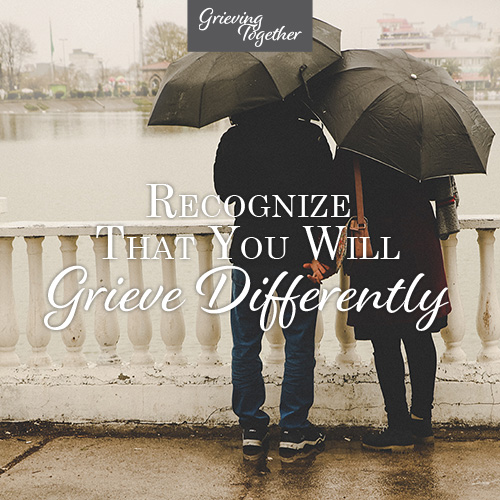Grieving Together: Recognize That You Will Grieve Differently
Walking through the loss of a child is extremely difficult on its own, but the difficulty can be greatly compounded when walking through that grief with another. In this series, we seek to write about the ways we can encourage and support our spouse in grief, and come together before the Lord instead of being driven apart by sorrow.

While pregnant with and following the loss of our sweet Max, my husband, Spencer, and I went through several different phases of grief.
The first round hit when we got the news that Max likely had Down syndrome. It was possibly the most complicated grief we experienced because it was full of so many “maybes” and “ifs” which made it incredibly messy to trudge through. But it was the also the phase of grief in which Spencer and I needed profoundly different things.
When I got the call from my midwife, I immediately hung up and called Spencer. When he answered the phone, I (very unwisely in retrospect) word-vomited all over him without the slightest warning. I totally shanghaied him with this (maybe) huge, (possibly) life-changing news that our son (probably) had Down syndrome. He was in the middle of the large co-working space at his office, and I dumped all of my fears, anxiety, and grief all over him. Bad move on my part.
He promptly left work and came home, and we began one of the longest afternoons of our life. Three and a half years later, I can still picture exactly where we sat in our living room as we started to navigate this news. But it was if we were navigating totally different continents. I needed to talk. He needed to sit in the silence. I needed to process out loud. He needed to process internally. I needed to dream and give life to the challenges and opportunities ahead of us. He needed to grieve and cry and yell. I needed to celebrate the son we were having. He needed to mourn the son we weren’t.
We spent about an hour alternating between silence and words, crying and staring into the distance. And after that first hour, through what can only be the wisdom of the Spirit whispering into us both, we simultaneously realized that we each were not the right people to process with the other. How tempting it is as spouses to believe we can and should fill every space and need for our partner. But in that moment, he was not capable of being who and what I needed, and vice versa.
So I called a best friend who happened to be a Special-Ed teacher with a real heart for that bonus chromosome as I drove over to my parents’ house. The second Mollie heard my voice as I told her we had some news, she just knew what I was going to say. She was overcome with joy and cried happy tears. It was exactly what I needed. And when I shared the news with my parents, they immediately started dreaming and talking about the challenges and opportunities ahead and affirmed my call to be Max’s mom, no matter who he was.
Spencer also called a best friend who immediately left work and came over to sit with Spencer and be sad, disappointed, angry, and confused. They lamented the loss of his hopes and dreams and expectations for his son, something Spencer felt deeply as a father. They mourned the hardships that would be ahead both for our son and for us.
Then, a few hours later when we came back together, I was able to hold my husband as he expressed the profound sense of loss he felt, and he was able to look expectantly toward the future of what could be with me. That day is cemented in my memory as one of the sweetest and most holy moments of our marriage—an opportunity to love one another that we absolutely got right. And we were only able to do that by realizing that we could not meet the other person’s needs until the Lord had met our own.
I do want to take a moment to make a very important note. We both went to safe, mutual, same-sex friends or family to meet our needs. It would have been entirely different and inappropriate had we gone to a friend of the opposite sex in that vulnerable and intimate emotional space.
Then, a few weeks later, we went through a second round of grief when Max’s Down syndrome was confirmed. And we experienced yet another round of grief when we found out that he had two small heart defects. Then again at 32 weeks when we found out he had hydrops.
And of course, the most intense, long-lasting, all-encompassing round of grief came when that sweet boy met Jesus moments after his birth.
While nothing could have fully prepared us for this immense loss, it felt as if the Lord had been spoon feeding us, getting us strengthened, and letting us practice our communication and ways to support one another before this shattered our hearts completely.
By the time Max died, we knew that we needed a circle wider than just our marriage. We both leaned on friends and family and found ways to process both with and without one another. But each and every night, as we lay in bed, listening to the deafening silence of our home, we knew where we stood—together. We knew that we had different needs, different emotions, and different ways of expressing them. But we were no longer fearful or threatened by that. And we no longer believed that was a weakness in our marriage.
My prayer for your marriage, as you navigate the loss of your child(ren), is that your differences would be a source of strength not weakness. That your differences would add to your bond not subtract. That you would find a new depth of compassion and love for your spouse as you walk this road alongside each other but on your own unique paths. Because I can promise that as long as you are both walking toward the Lord and pursuing each other’s hearts, your differences need not be an undoing but rather a uniting.
In Ephesians chapter 4, Paul speaks about unity in the body of Christ, but it is profoundly applicable within a marriage. He says in verse 7, “But to each one of us grace has been given as Christ apportioned it.” He goes on to talk about how we each have unique God-given giftings and equippings. “From [Christ] the whole body, joined and held together by every supporting ligament, grows and builds itself up in love, as each part does its work” (vs 16). You and your husband are different people, with different gifts, different callings, and different jobs. Of course you will experience grief differently.
But, just as Paul urges us, I want to exhort you to, “Be humble and gentle; be patient, bearing with one another in love. Make every effort to keep the unity of the Spirit through the bond of peace. For there is one body and one Spirit, just you were called to one hope when you were called” (vs 2-5).
When we can see and appreciate the unique perspectives we each have and the way we benefit and are built up by our spouse’s giftings that are so often different than our own, we can pursue a new depth of unity. See your differences in grief as what they are—mere differences, not shortcomings. And pursue the Spirit of unity within your marriage. If you do, I promise you will come out the other side with a strength and love you could only dream of.
- Sam
Hope Mom to Max and Baby Martin
Sam is a graphic designer and marketing professional in Frisco, Texas. She and her husband, Spencer, have been married since 2011, and have two children in heaven, Baby Martin (Jan 2016) and Max (Dec 2016), and two in their arms, Lachlan (Dec 2017) and Meryn (Aug 2019). They enjoy serving in their church, building community, and restoring their 100 year-old home. Sam is in two book clubs and can always be found with a book in her purse and a warm beverage in her hand.


Got something to say?